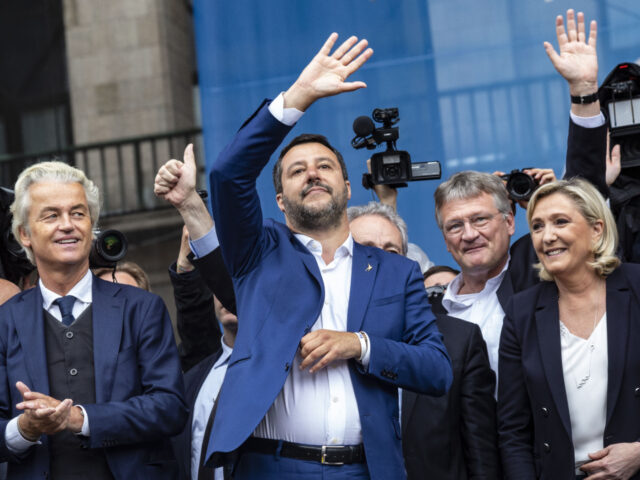The upcoming European Parliament elections will see a “sharp turn to the right” as populist parties are projected to be victorious in at least nine EU member states and come in second or third in a further nine countries.
According to an analysis of opinion polls in each EU member state in combination with statistical modelling based on the previous performance of national parties, the globalist European Council on Foreign Relations (ECFR) think tank has predicted that right-wing populist parties will come out on top in Austria, Belgium, the Czech Republic, France, Hungary, Italy, the Netherlands, Poland, and Slovakia in the European Parliament elections in June.
Meanwhile, the report predicted that populist parties will also make big gains in Bulgaria, Estonia, Finland, Germany, Latvia, Portugal, Romania, Spain, and Sweden, where they are on pace to either come in second or third place in the votes.
The surge in populist-nationalist parties will be led by the Identity and Democracy (ID) parliamentary group, which includes the Alternative for Germany (AfD), Marine Le Pen’s National Rally (RN) in France, and the League led by Italian Deputy Prime Minister Matteo Salvini. According to the projections, ID is set to increase its representation in the EU Parliament by 40 seats to 98 in the 720-seat chamber.
This would make the ID coalition group the third largest force within the parliament, overtaking the Renew Europe (RE) bloc spearheaded by French President Emmanuel Macron’s Renaissance party. This would likely be a major political blow to Macron’s globalist government in France and perhaps serve as a blow to his standing throughout Europe.
The predicted surge is redolent of the 2019 European Elections, Britain’s last as an EU member state, when Nigel Farage’s Brexit Party was so successful it became overnight not just the largest party in the UK in the European Parliament, but the single largest party in the whole of Europe.
The authors said that off the backs of successes last year, notably the sweeping victory of Geert Wilders’ Freedom Party (PVV) in November’s Dutch general election and the surge in power of the National Rally in France, populist parties are set to continue playing an “important role in shaping European politics” during the EU Parliament elections and beyond.
“The results indicate that the European Parliament will likely take a sharp turn to the right after June 2024. While the parliament is not the most significant EU institution when it comes to foreign policy, the way in which the political groups align after the elections, and the impact that these elections have on national debates in member states, will have significant implications for the European Commission’s and Council’s ability to make foreign policy choices, most notably in implementing the next phase of the European Green Deal,” they said.
In the wake of soaring energy prices throughout Europe over the past two years and the failure of so-called green energy initiatives to mitigate international shocks to the energy market, such as the supply chain impacts of lockdowns and the war in Ukraine, the Greens are among those projected to suffer the hardest defeats in the elections, with the report predicting the parliamentary group to fall from 71 seats to 61.
The issue of climate change-inspired regulations and green agenda policies pushed by Brussels is also likely to play a significant role in the elections, with farmers staging large-scale tractor protests across the continent, including in France, Germany, Poland, and Romania.
Meanwhile, the neo-liberal centrist parties that currently dominate the parliament, the European People’s Party (EPP), the Progressive Alliance of Socialists and Democrats (S&D) and Renew (RE), are also expected to see their numbers continue to fall after losing ground in the previous two elections, with an expected decline from 420 seats to 390 in the upcoming votes.
The so-called “super coalition” of the three parties would therefore only represent 54 per cent of seats held in the parliament, compared to their current 60 per cent. Given the still diverse set of interests represented within the international centrist coalition, it may prove difficult to consistently maintain majority votes within the parliament.
“This paradigm shift could have several consequences on the EU political agenda, according to ECFR. If the new composition of Parliament should not, initially, affect aid to Ukraine, for example, the fact that the grand centrist coalition will likely be less dominant than before could have an influence on certain issues, such as economic and fiscal freedom, the environment, or immigration and asylum policies,” the ECFR noted.
They went on to predict that the gains of populist parties will likely “bolster” the standing of national governments at the EU Council level, such as Hungary, Italy, Slovakia, Sweden, and a likely Geert Wilders-led government in the Netherlands, in their attempts to roll back the influence Brussels has over individual member states.
The globalist think tank warned that their findings should be a “wake-up call” for progressive policymakers throughout Europe, however, rather than listening to the growing opposition against open borders, the green agenda, funding the war in Ukraine, the European Council on Foreign Relations argued that it is principally a messaging problem and that left-wing parties merely need to impress upon the public the “economic and security imperatives” supposedly behind their policies.

COMMENTS
Please let us know if you're having issues with commenting.